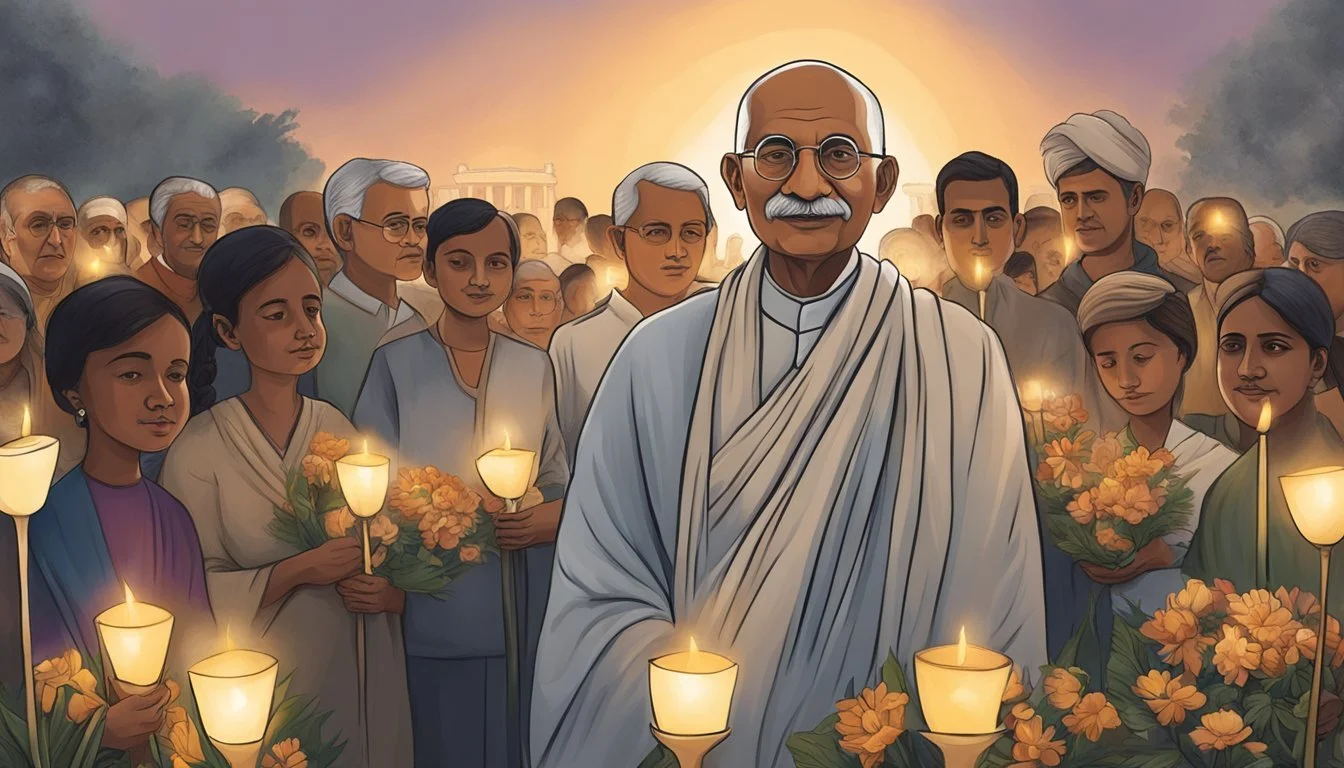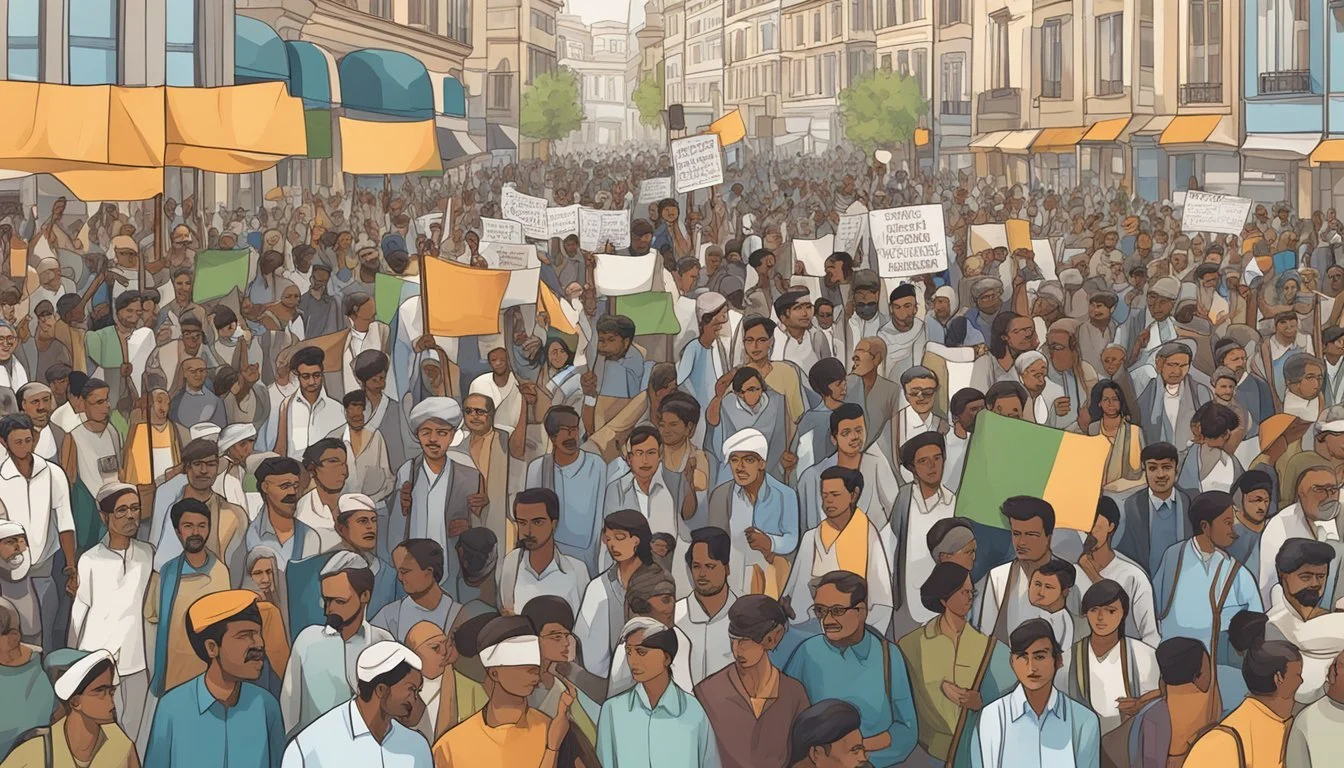7 Films Exploring Gandhi's Legacy and Tragic Assassination
Cinematic Tributes to a Nonviolent Icon
Films have long served as powerful mediums to explore historical figures and events. Mahatma Gandhi, a pivotal figure in India's independence movement, has been the subject of numerous cinematic works that examine his life, philosophies, and lasting impact.
These films not only depict Gandhi's non-violent approach to social change but also shed light on the complex circumstances surrounding his tragic assassination. By portraying different aspects of Gandhi's life and legacy, these movies offer viewers a multifaceted understanding of the man who came to be known as the Father of the Nation in India.
1) 'Gandhi' (1982) - Directed by Richard Attenborough
'Gandhi' is a monumental biographical film that chronicles the life of Mahatma Gandhi. The movie stars Ben Kingsley in a career-defining performance as the titular character.
Richard Attenborough's direction brings Gandhi's journey to life, from his early days as a lawyer in South Africa to his role as a leader in India's independence movement. The film showcases Gandhi's philosophy of non-violent civil disobedience and its impact on history.
'Gandhi' received critical acclaim and commercial success upon its release. It won eight Academy Awards, including Best Picture, Best Director for Attenborough, and Best Actor for Kingsley.
The film's stunning cinematography captures the essence of India during the colonial era. It features a star-studded cast, including Candice Bergen and John Gielgud in supporting roles.
'Gandhi' remains a powerful tribute to the man who inspired non-violent movements worldwide. Its portrayal of Gandhi's life and principles continues to resonate with audiences decades after its release.
https://en.wikipedia.org/wiki/Gandhi_(film)
2) 'The Making of the Mahatma' (1996) - Shyam Benegal's portrayal
Shyam Benegal's 'The Making of the Mahatma' offers a unique perspective on Gandhi's formative years in South Africa. The film focuses on the 21-year period that shaped Gandhi's philosophy and tactics of non-violent resistance.
Rajit Kapoor portrays the young Gandhi, capturing his transformation from an inexperienced lawyer to a determined civil rights leader. The narrative explores Gandhi's experiences with racial discrimination and his growing commitment to social justice.
Benegal's direction highlights pivotal moments in Gandhi's journey, including his decision to stay in South Africa and fight against oppressive laws. The film depicts Gandhi's experiments with communal living and the development of his satyagraha principles.
'The Making of the Mahatma' stands out for its attention to detail in recreating the historical setting of early 20th century South Africa. It provides insight into the personal and political challenges that influenced Gandhi's evolution into the Mahatma.
https://www.imdb.com/title/tt0117093/
3) 'Hey Ram' (2000) - Kamal Haasan's exploration
'Hey Ram' is a thought-provoking Indian film directed by and starring Kamal Haasan. The movie examines the Partition of India and the assassination of Mahatma Gandhi through the eyes of its protagonist, Saketh Ram.
Set against the backdrop of the 1940s, the film portrays Saketh Ram's transformation from a man filled with hatred to one who understands Gandhi's message of non-violence. The story unfolds during the tumultuous period of Direct Action Day riots in Calcutta.
Saketh Ram's journey is marked by personal tragedy when his wife is raped and killed during the riots. This event fuels his initial anger towards Gandhi, whom he blames for the country's turmoil.
The film explores complex themes of religious conflict, nationalism, and the power of forgiveness. It presents a nuanced view of Gandhi's impact on Indian society and the forces that led to his assassination.
'Hey Ram' stands out for its historical accuracy and attention to detail. It offers a unique perspective on Gandhi's final days and the motivations behind his tragic death.
[https://en.wikipedia.org/wiki/Hey_Ram]
4) 'Lage Raho Munna Bhai' (2006) - Rajkumar Hirani's comedic take
'Lage Raho Munna Bhai' is a satirical comedy-drama that brings Gandhi's teachings to modern-day Mumbai. Directed by Rajkumar Hirani, the film stars Sanjay Dutt as Munna Bhai, a local gangster who unexpectedly becomes an advocate for Gandhian principles.
The movie cleverly introduces Gandhi as a hallucinatory figure, visible only to Munna. This imaginative device allows for humorous and thought-provoking interactions between the protagonist and the Mahatma.
Through Munna's journey, the film explores how Gandhi's ideals of non-violence, truth, and civil disobedience can be applied to contemporary social issues. It presents these concepts in an accessible and entertaining manner, sparking renewed interest in Gandhian philosophy among audiences.
'Lage Raho Munna Bhai' successfully balances comedy with social commentary, making it a significant contribution to films about Gandhi's legacy. Its popularity led to the coining of the term "Gandhigiri," describing the practice of Gandhi's teachings in everyday life.
https://en.wikipedia.org/wiki/Lage_Raho_Munna_Bhai
5) 'Mahatma Gandhi: The Rise to Fame' - Insightful documentary
'Mahatma Gandhi: The Rise to Fame' offers a nuanced portrayal of Gandhi's journey from obscure lawyer to national leader. The documentary explores Gandhi's transformation and the development of his non-violent philosophy.
The film delves into Gandhi's early years in India and his pivotal role in the country's independence movement. It showcases key moments, such as the 1930 Salt March, where Gandhi led protesters to the beach to collect sea salt in defiance of British taxation.
Narrated by Mishal Husain, the documentary presents a more complex view of Gandhi than typical portrayals. It examines his promotion of non-violent protest, known as "Satyagraha," and its impact on Indian society and politics.
The film provides insights into Gandhi's leadership style and his influence on India's struggle for freedom. It also touches on the challenges he faced, including British opposition and internal conflicts within the independence movement.
https://www.bbc.co.uk/programmes/b03z3k7m
6) 'Sardar' (1993) - Story highlighting Gandhi's role
'Sardar' focuses on the life of Sardar Vallabhbhai Patel, a key figure in India's independence movement. The film showcases Gandhi's significant influence on Patel's political journey and their close relationship.
Directed by Ketan Mehta, the movie stars Paresh Rawal as Patel and Annu Kapoor as Gandhi. It portrays how Gandhi's teachings of non-violence shaped Patel's approach to the freedom struggle.
The film depicts Patel's initial skepticism towards Gandhi's methods. As the story progresses, it shows Patel's gradual understanding and acceptance of Gandhi's philosophy after attending his lectures.
'Sardar' illustrates the deep bond between Gandhi and Patel, emphasizing their collaborative efforts in India's fight for independence. It highlights how Gandhi's ideals inspired and guided many of India's political leaders during this crucial period.
Through its narrative, the film offers insights into Gandhi's role in shaping the political landscape of India during its early years of independence.
7) 'Gandhi, My Father' (2007) - View from Harilal Gandhi
'Gandhi, My Father' offers a unique perspective on Mahatma Gandhi's life through the eyes of his eldest son, Harilal. The film explores the complex and strained relationship between the two men.
Directed by Feroz Abbas Khan, the movie stars Akshaye Khanna as Harilal and Darshan Jariwala as Mahatma Gandhi. It delves into the personal sacrifices and conflicts that arose from Gandhi's dedication to his political ideals.
The narrative focuses on Harilal's struggles to forge his own identity while living in the shadow of his famous father. It portrays his failed attempts to gain his father's approval and the subsequent turmoil in his personal life.
The film sheds light on the lesser-known aspects of Gandhi's family life, revealing the human side of the iconic leader. It presents a nuanced view of Gandhi as both a national hero and a flawed father figure.
'Gandhi, My Father' received critical acclaim for its performances and its honest portrayal of a troubled father-son relationship. It offers viewers a different angle on Gandhi's legacy, examining the personal cost of his public achievements.
https://en.wikipedia.org/wiki/Gandhi,_My_Father
Gandhi's Historical Impact
Mahatma Gandhi's influence on India's struggle for independence and global civil rights movements was profound. His philosophy of nonviolent resistance and commitment to social justice inspired millions worldwide.
Nonviolent Resistance
Gandhi pioneered satyagraha, a form of nonviolent civil disobedience. This approach proved effective in challenging British colonial rule in India.
Gandhi's methods included peaceful protests, fasting, and boycotts of British goods. These tactics garnered widespread support and exposed the injustices of colonial rule.
His philosophy influenced later civil rights leaders like Martin Luther King Jr. and Nelson Mandela. They adopted nonviolent resistance in their own struggles against oppression.
Role in Indian Independence
Gandhi played a crucial role in India's independence movement. He united diverse groups under the banner of nonviolent resistance against British rule.
Gandhi led several major campaigns, including the Salt March of 1930. This protest against the British salt monopoly galvanized public support for independence.
His efforts culminated in the Quit India Movement of 1942. This mass civil disobedience campaign significantly weakened British control.
Gandhi's leadership and moral authority were instrumental in achieving India's independence in 1947. His vision of a free and unified India shaped the nation's early years.
The Context of Gandhi's Assassination
Gandhi's assassination in 1948 occurred during a tumultuous period in India's history. The newly independent nation faced significant challenges and internal divisions that set the stage for this tragic event.
Political Climate of Post-Independence India
India gained independence from British rule on August 15, 1947. The partition of India and Pakistan led to widespread violence and displacement. Millions of people were forced to relocate across the new borders.
Gandhi advocated for peace and unity during this chaotic time. He undertook fasts to promote harmony between Hindus and Muslims. His efforts sometimes drew criticism from those who favored a more aggressive approach.
The new Indian government, led by Prime Minister Jawaharlal Nehru, faced immense challenges. These included integrating princely states, addressing poverty, and managing religious tensions.
Controversies and Opposition
Gandhi's stance on various issues generated opposition from different groups. His support for Muslim rights angered some Hindu nationalists. They viewed his policies as appeasing Pakistan at India's expense.
His economic vision of village-based self-sufficiency clashed with plans for rapid industrialization. This created tension with some political and business leaders.
Gandhi's advocacy for caste equality and women's rights challenged traditional social structures. Conservative elements resisted these progressive ideas.
His decision to fast in support of paying Pakistan its share of partitioned assets further inflamed tensions. Some saw this as betraying India's interests during a time of heightened animosity between the two nations.




